
Thirty-five years ago this month, Pacifica Radio station WBAI broadcast a marathon reading of Leo Tolstoy’s classic work “War and Peace.” For four and a half days ending December 6, 1970, more than 170 people from all walks of life came together for a reading of the great Russian epic “War and Peace.” We speak with Professor Andy Kaufman of the University of Virginia about the significance of War and Peace and its author, Leo Tolstoy. [includes rush transcript]
Thirty-five years ago this month, Leo Tolstoy’s classic work “War and Peace” took over the airwaves of New York’s WBAI radio station, part of the Pacifica Radio Network. It was the 100th anniversary of the book–and it was a time of war. More than 300,000 US troops were in Vietnam. The final death toll would be 58,000 U.S. troops, millions of Vietnamese, Cambodians and Laosians. Anti-war sentiment was strong.
For four and a half days ending December 6, 1970, more than 170 people from all walks of life came together for a reading of the great Russian epic “War and Peace.” The marathon reading captivated New York City.
- The Voices of WBAI’s 1970 War and Peace Broadcast.
Nearly five days after the reading had begun, the legendary actor Morris Carnovsky read the famous last words to Leo Tolstoy’s epic novel–ending what was at the time, the longest continuous broadcast in radio history. The special had continued for four and a half days, stopping only for music breaks and nightly reports on the Vietnam War.
We speak with professor Andy Kaufman to talk about the significance of War and Peace and its author, Leo Tolstoy.
- Andy Kaufman, visiting lecturer at the University of Virgnia where he is a professor of Slavic languages and literature. He is fluent in Russian and has lived in Russia extensively and visited many of the places that are described in Tolstoy’s novels.
Links:
- PacificaRadioArchives.org
- Pacifica Radio Archives War and Peace Broadcast: 35th Anniversary
Transcript
AMY GOODMAN: We’re joined in Washington now by Professor Andy Kaufman to talk about the significance of War and Peace and its author, Leo Tolstoy. He’s a visiting lecturer at the University of Virginia, where he’s Professor of Slavic Languages and Literature. He’s fluent in Russian and has lived in Russia for extended periods of time. Afterwards, we’ll bring you a documentary about the marathon radio broadcast of War and Peace. Professor Kaufman, thanks for joining us.
ANDY KAUFMAN: Thank you for having me. Good morning.
AMY GOODMAN: It’s good to be with you. Can you talk about the significance of Leo Tolstoy and his novel, War and Peace?
ANDY KAUFMAN: Sure, let me start by talking a little bit about Tolstoy, because, you see, Leo Tolstoy was more than a great writer. He was a phenomenon. He’s one of those writers that actually didn’t have to die to become famous. He was an international celebrity in his own day. In fact, when he died in 1910, his funeral, there was hardly a major newspaper, radio broadcast in the world that didn’t cover Tolstoy’s death.
One of the reasons for his celebrity is not just because he was a great writer, he was a great teacher of life. And the range of interests that his works deal with, his range of concerns, the character types, the sprawling expanse of life that he explores in his works is absolutely breath-taking. And this is why I say that Tolstoy is a kind of phenomenon. One critic called him a giant harnessed to his great subject — all of human life. And that same critic said, actually, that Tolstoy is like a vast reflector of life, like a great natural lake. And that is who he was as a person and who he was as a writer, as well.
AMY GOODMAN: And what were the circumstances under which he wrote the book, War and Peace?
ANDY KAUFMAN: Well, he wrote War and Peace in the 1860s. He actually had already established himself as an extraordinarily talented writer the decade before, actually as a writer of war. He wrote what he became famous for, the so-called Sevastopol Tales, which was actually about the Crimean War of the 1850s, which he, himself, participated in. And this was the work that he wrote in, I think it was, 1855-1856. It really established him as a unique writer who had this capacity to describe war as it really happens, not as it happens in our romantic imagination or glorified, but really what people go through. Well, War and Peace is the second chapter in that aspect of Tolstoy. And War and Peace was written the 1860s. And it really put him over the top. It established him not simply as an extraordinarily talented writer, but really as writer on a par with Homer, Shakespeare, Goethe.
AMY GOODMAN: Can you talk about his transformation, Leo Tolstoy’s transformation?
ANDY KAUFMAN: Well, Tolstoy, actually, I think was in a constant state of transformation. You know, one of the reasons he’s such a fascinating personality is because he was on this constant moral quest for perfection: perfection of himself, perfection of the world. And he always came up short. If you read his diaries from when he was in his twenties, his diary entries are extremely entertaining reading, because you have him talking about, you know, 'last night I lost 3,000 rubles at cards. I was womanizing. I got to bed late. I woke up this morning with a hangover. But today is the day I'm going to reform myself,’ he would say. And, of course, the very next day, you open his diary: 'Today, I woke up out of bed, you know, at 2:00 in the morning. I lost another 2,000 rubles last night.' So he was constantly trying to improve himself, but he was coming up against his own nature, his own human nature.
And then when he was — later in life, he underwent a major spiritual transformation. Basically in his fifties, he had rejected everything he did up to that point in his life as aristocratic indulgence, and he claims that he lived a debaucherous life, and that he was now going to devote the remainder of his career to writing moralistic treatises, essays, political essays, social essays, which is what he did for the next 20 years.
AMY GOODMAN: Would you describe him as a pacifist?
ANDY KAUFMAN: Later in his life, after this transition, after this spiritual conversion, sure, Tolstoy was clearly a pacifist. And, in fact, he was the originator, one of the original originators of this notion of nonresistance to evil, which was very influential to Gandhi in the 20th century and also to our own Henry David Thoreau in the 19th century.
AMY GOODMAN: In fact, he had correspondence with Gandhi.
ANDY KAUFMAN: Correspondence with, well, Tolstoy — correspondence with Gandhi and also, I think, with Henry David Thoreau, very interestingly. But, you see, earlier in his career, part of the reason that he became a pacifist later on is because earlier in his career, he actually was excited by the whole military experience. He saw the carnage, he saw the suffering and he depicted that as very few writers ever have. But at the same time, as a young man, there was something in war that was creative, that was stimulating, that was exciting, that really informs a lot of his early war writing. So he had a very contradictory relationship with this thing called war.
AMY GOODMAN: Finally, War and Peace, how it changed literature and affected not only the people, the country he lived in, but the people of the world.
ANDY KAUFMAN: War and Peace, there had been novels about war, there had been novels about peace before War and Peace, but there had never been a novel like War and Peace. With War and Peace, Tolstoy really revolutionized, not only Russian literature, but European literature. Nobody had seen a work like this before, in which there were hundreds and hundreds of characters from all walks of life; multiple plot lines, some intersecting, some just there; characters appearing for a hundred pages and then disappearing for 300 pages and reappearing. I mean, people couldn’t figure out, what is this thing? This is a massive cornucopia of human experience.
And, in fact, people weren’t even sure what to call War and Peace when it first came out. Henry James, a British writer and critic, called it a “loose baggy monsters,” precisely because it didn’t fit into any neat structural category. But that was Tolstoy’s point. You see, Tolstoy’s imagination, his sense of life was too big to be captured in any traditional narrative structure as people had written before. So he had to create his own kind of narrative. And he revolutionized the European novel and really did a great deal to contribute to the international reputation of Russian culture and Russian literature.
AMY GOODMAN: Andy Kaufman, I want to thank you for being with us, a visiting lecturer at the University of Virginia, where he teaches Slavic Languages and Literature.

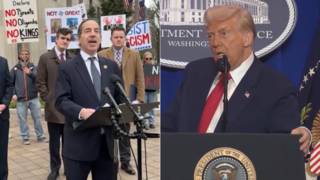
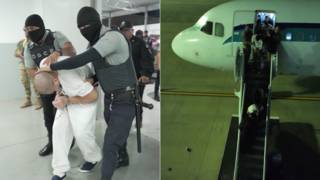
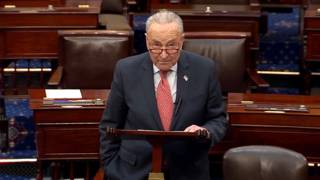
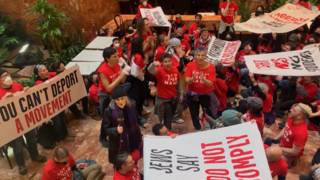





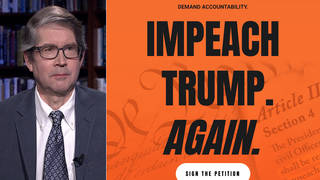
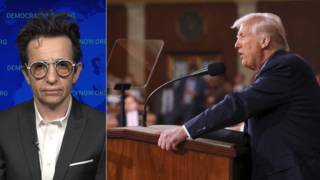
Media Options